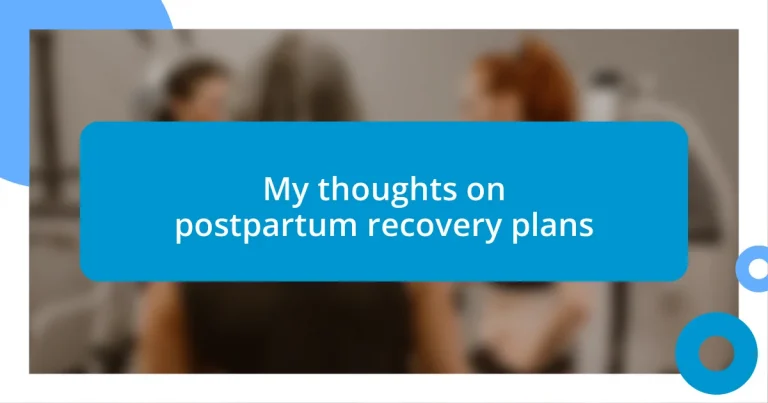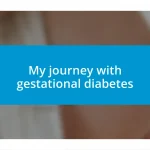Key takeaways:
- Postpartum recovery encompasses physical, emotional, and mental well-being, highlighting the importance of a well-rounded recovery plan.
- Nutrition and hydration are critical for recovery, with a focus on whole foods and establishing healthy routines to boost energy levels and overall health.
- Mental health support, self-care practices, and creating a personalized recovery timeline encourage emotional resilience and help manage the challenges of new motherhood.
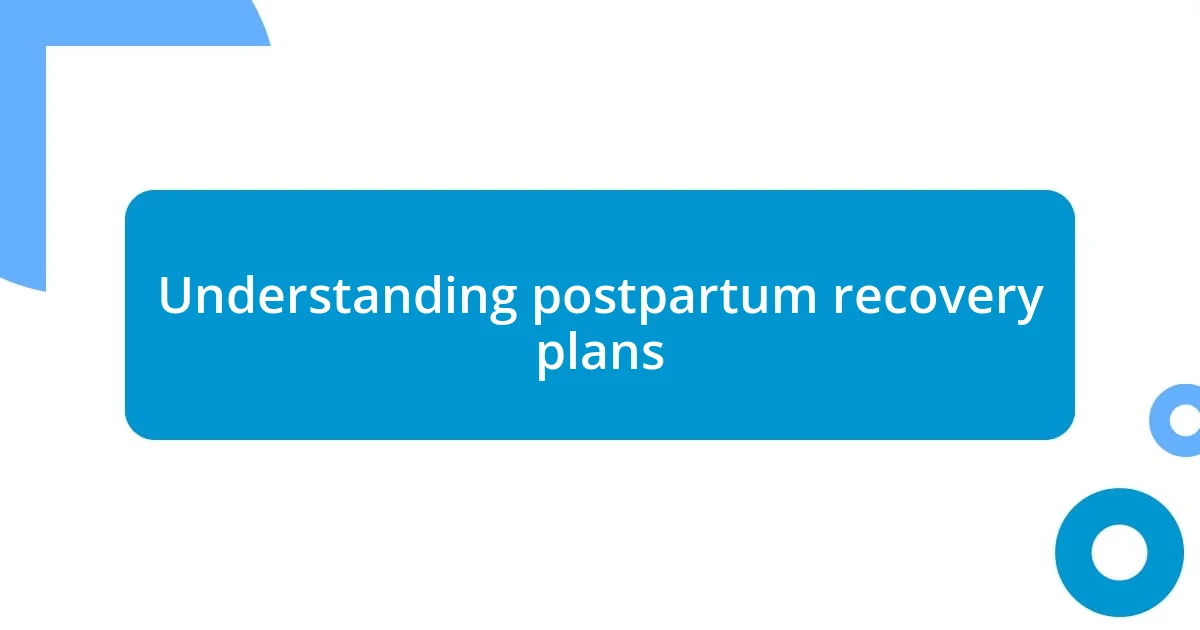
Understanding postpartum recovery plans
Understanding postpartum recovery plans goes beyond just physical healing; it encompasses emotional and mental well-being too. After my own experience, I realized how important it is to consider things like hormonal changes and the adjustment to motherhood. Have you ever found yourself feeling overwhelmed after welcoming a new life? I certainly did, and that’s where a well-rounded recovery plan becomes essential.
It’s fascinating how a good postpartum recovery plan also addresses practical aspects, like nutrition and sleep recovery. I remember the days when I felt like a walking zombie while trying to balance feeding schedules and coping with sleep deprivation. This made me appreciate the value of having a structured approach—planning meals ahead and carving out time for naps really shifted my perspective and helped me regain some much-needed energy.
Moreover, the support system one has can make a significant difference in recovery. When friends or family chip in, whether it’s with meal prep or simply lending an ear, it can ease that pressure we often feel to be supermoms. Have you ever reached out to someone during a tough moment? Personally, sharing my struggles with close friends not only brought relief but also deep connections that I cherish to this day.
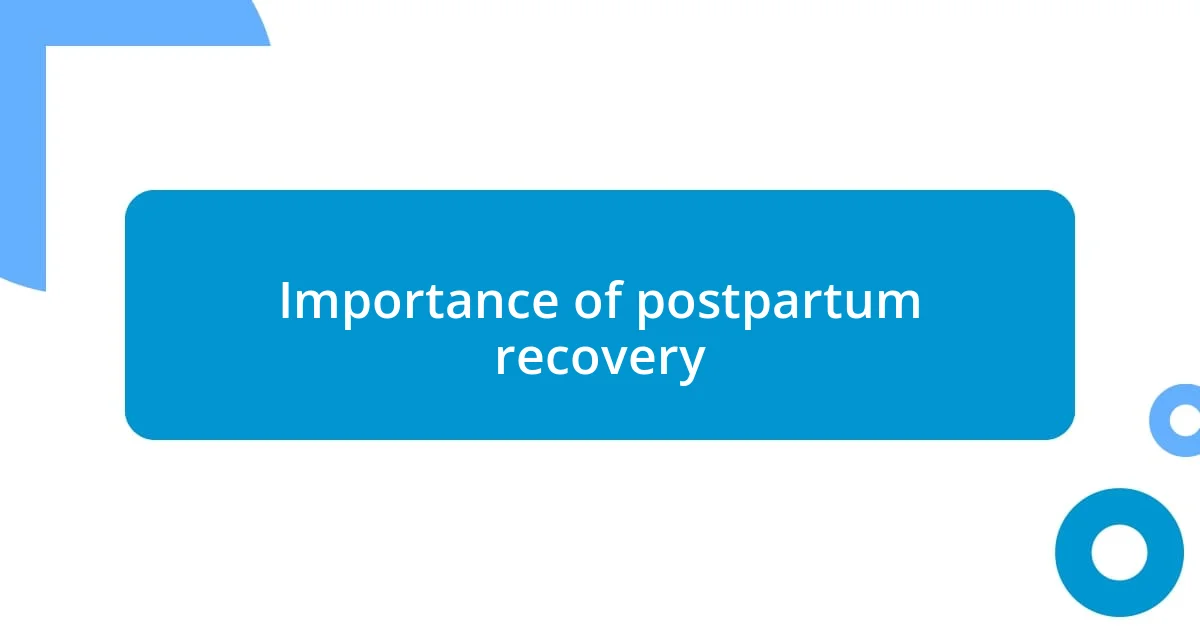
Importance of postpartum recovery
The importance of postpartum recovery cannot be overstated. It’s a journey that impacts not just the physical body but also deep emotional and mental health consequences. I clearly remember feeling lost in those early weeks, grappling with intense mood swings and fatigue. Recognizing that this was part of my recovery helped me approach the situation with compassion for myself.
- Prioritizing recovery fosters a sense of stability, allowing new mothers to adjust more smoothly to their roles.
- It cultivates a healthier environment for the baby, as a well-rested and emotionally balanced parent can better nurture their little one.
- Engaging in self-care practices strengthens the parent-child bond, creating precious moments that can become cherished memories.
- A solid recovery plan supports long-term health, contributing to a better overall quality of life.
Every little bit counts, and I wish I had known just how much taking the time for myself could influence not only my happiness but also my baby’s growth. In moments of self-doubt, it’s essential to recognize that prioritizing postpartum recovery isn’t selfish—it’s a vital step towards becoming the best parent possible.
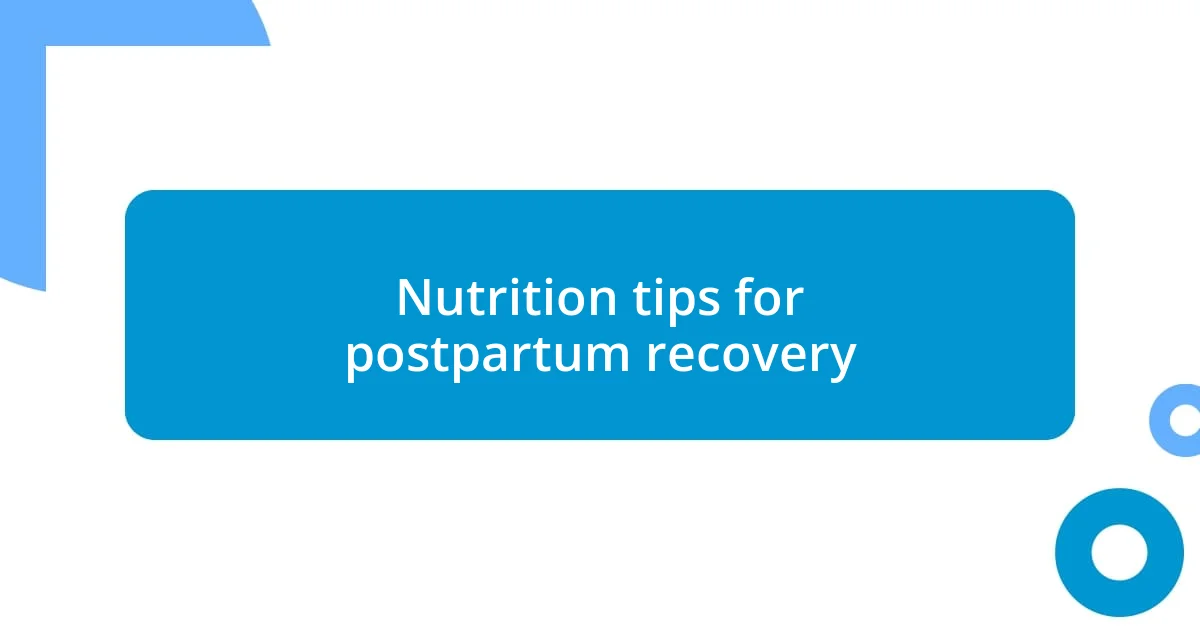
Nutrition tips for postpartum recovery
Nutrition plays a vital role in postpartum recovery, and I can’t stress enough how important it was for me to focus on my diet during that time. I quickly learned that having a well-balanced plate—filled with lean proteins, healthy fats, and a colorful array of fruits and vegetables—was essential for recharging my energy levels. I still recall days when I opted for quick snacks and regretted them later as my energy plummeted. Nourishing my body with whole foods truly made a noticeable difference.
Hydration is another crucial element that I often overlooked. After giving birth, it’s easy to forget to drink enough water, especially when caring for a newborn. I personally found that keeping a water bottle close by helped me stay hydrated and reduced my fatigue. Sometimes, even the simple act of sipping water while nursing became a welcoming ritual, grounding me amid the chaos.
To illustrate how certain foods can aid recovery, here’s a quick comparison of nutrient-dense options that I found helpful during my postpartum period:
| Food | Benefit |
|---|---|
| Leafy Greens | High in vitamins and minerals, supports healing. |
| Oats | Rich in fiber, helps with energy levels and digestion. |
| Berries | Packed with antioxidants, boosts immunity. |
| Salmon | Source of omega-3 fatty acids, promotes brain health. |
Incorporating these foods into my meal planning not only assisted with recovery but also made me feel good about nourishing my body and baby. What about you? Have you considered how your dietary choices can influence your own recovery journey?
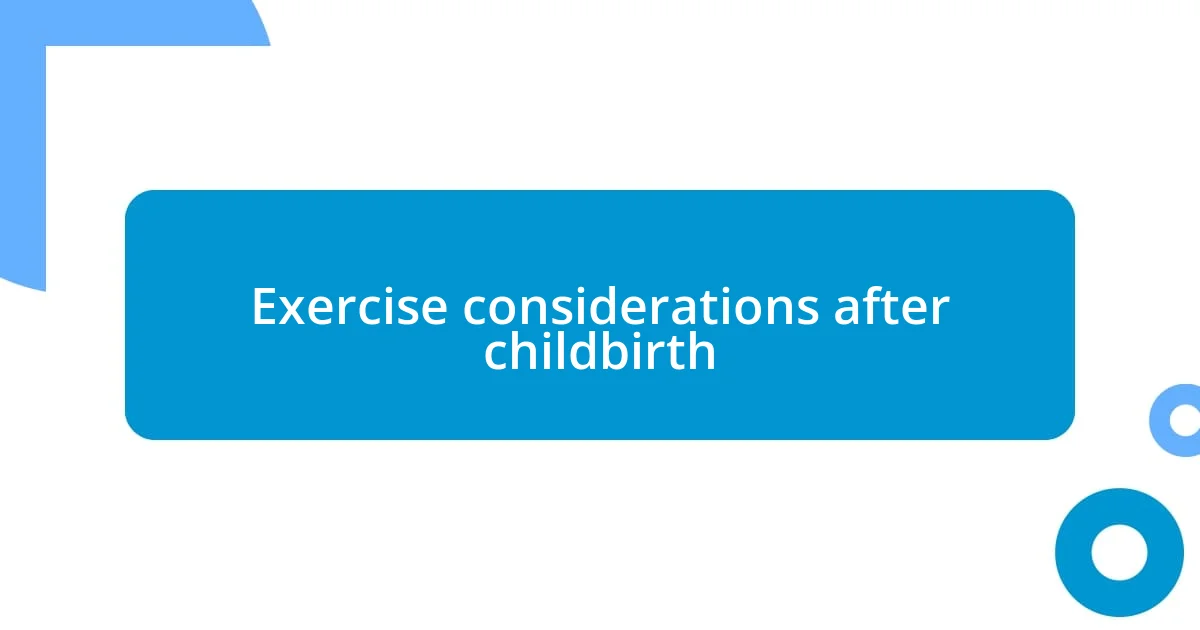
Exercise considerations after childbirth
After childbirth, exercising again can feel daunting. I remember feeling a mix of excitement and apprehension the first time I thought about getting back into my routine. It’s crucial to listen to your body during this phase. Gentle activities like walking or postpartum yoga can help ease you back into movement without overwhelming your healing body.
Another important consideration is to consult with your healthcare provider before starting any exercise program. I found it invaluable to have a clear understanding of what my body had been through and what was safe for me. Were there any limitations? I was surprised to learn how pelvic floor exercises could be a gentle yet effective way to strengthen that area post-delivery.
Gradually incorporating strength training can also support recovery. I recall starting with simple exercises like bodyweight squats and resistance bands at home. It felt rewarding to witness my body regain strength, but I always made sure to prioritize form over intensity. How about you? Have you thought about which exercises might feel good and safe for your postpartum journey?
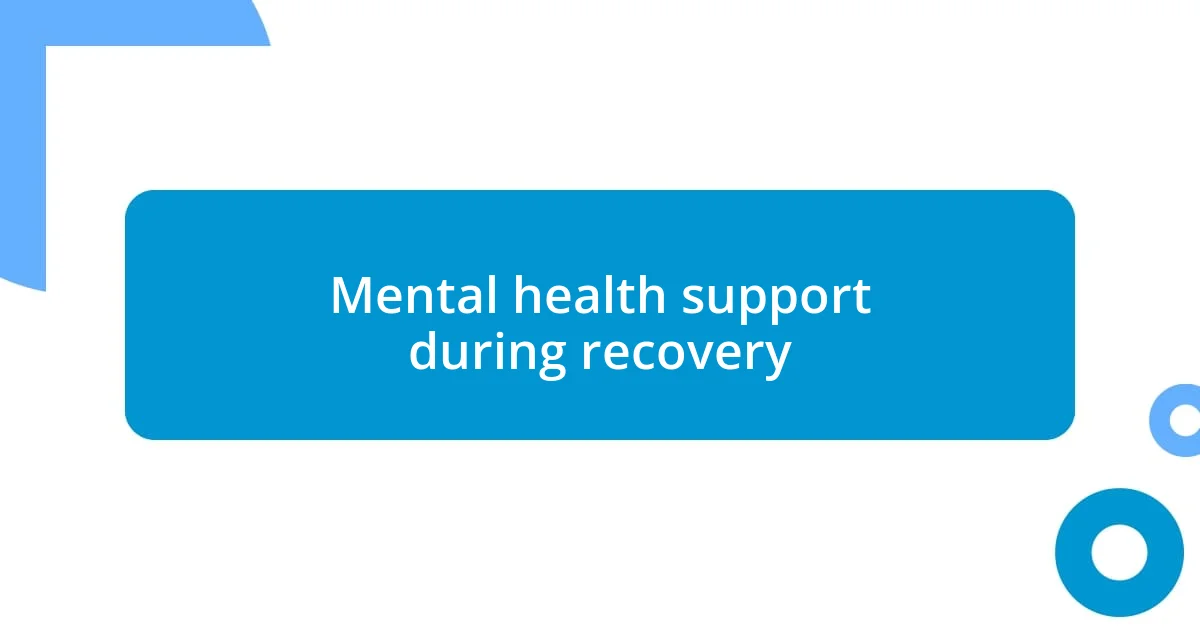
Mental health support during recovery
Mental health support is an essential part of postpartum recovery, and I can’t emphasize enough how pivotal it was for me to prioritize my emotional well-being. The changes that come with motherhood can sometimes feel overwhelming, so seeking help from mental health professionals or joining support groups made a world of difference. I remember attending a local postpartum group where sharing experiences with other moms helped me feel understood and less isolated. Have you ever found comfort in sharing your struggles with others?
It’s equally important to acknowledge the role that self-care plays in sustaining mental health during recovery. I learned that setting aside quiet moments for myself, whether it was enjoying a cup of tea or indulging in a short meditation, helped me reconnect with my feelings. These little rituals turned into my lifelines, especially on tougher days. Have you considered what small acts of kindness you could extend to yourself during this time?
Navigating the rollercoaster of emotions following childbirth can be challenging, and I found that having an open dialogue with my partner about how I felt made a significant impact. Sharing feelings of joy, anxiety, or even sadness was a step toward healing. It often surprises me how opening up like this not only helps maintain my mental balance but also strengthens the bond we share. Have you explored ways to communicate your feelings with your loved ones during your recovery?
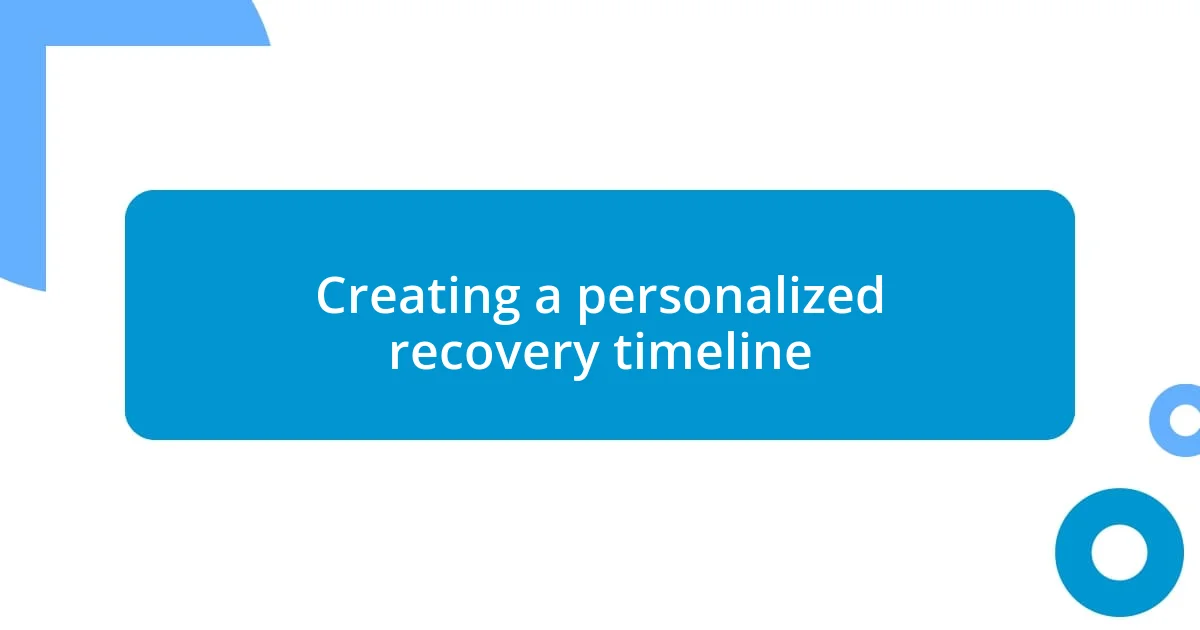
Creating a personalized recovery timeline
Creating a personalized recovery timeline is a vital step in postpartum recovery. I remember sitting down with a planner, mapping out my goals week by week. Initially, I set small, achievable milestones, like taking short walks or doing gentle stretches. Sometimes, I found it helpful to write these goals in bright colors; it made them feel more exciting and less daunting. Have you, too, thought about how visualizing your recovery journey can motivate you?
The timeline I created was flexible, allowing for adjustments based on how I felt each day. There were times when I overestimated my energy or experienced unexpected emotional shifts. I’ve learned that acknowledging my limits was crucial. Recognizing when to rest rather than push through has been a game changer for my recovery. Have you considered how listening to your body might influence your timeline?
Additionally, I incorporated regular check-ins on my progress into my plan. Seeing how far I had come after just a few weeks often motivated me to keep going. I even set aside moments to celebrate my small victories, like completing a short workout or feeling mentally clearer. These reflections not only kept me grounded but reinforced the idea that recovery is about embracing the journey, rather than rushing to the finish line. How do you plan to acknowledge your milestones along the way?












